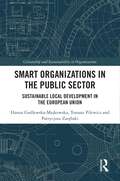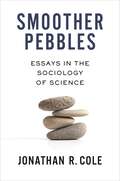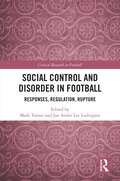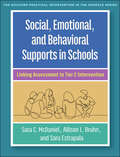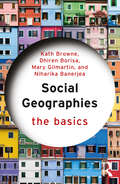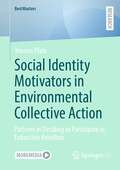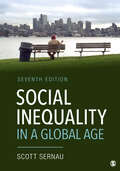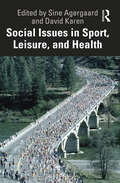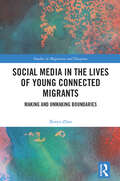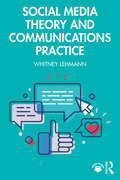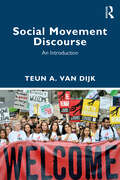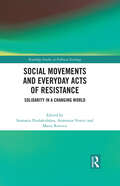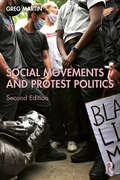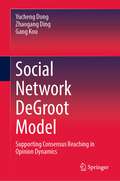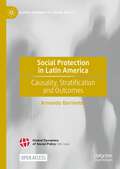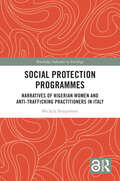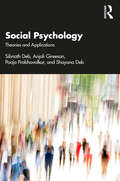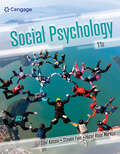- Table View
- List View
Smart Organizations in the Public Sector: Sustainable Local Development in the European Union (Citizenship and Sustainability in Organizations)
by Hanna Godlewska-Majkowska Tomasz Pilewicz Patrycjusz ZarębskiHow does a smart organization model enable self-governments to lead local and regional development in a sustainable and resilient manner? What are key aspects of smart organizations impacting the success of self-governments in attracting and retaining residents, entrepreneurs, and investors? Smart organizations became a relevant construct in economic and management sciences. They supply many practical applications for self-governments and public sector organizations that are looking for effective ways to leverage their resources and capabilities in the local and regional development process. This research monograph indicates how factors of smart organizations in local administration lead to sustainable and resilient development processes. In parallel, the monograph is a practical guide for local government managers looking for the best, international practices in collecting, researching, and interpreting data for making decisions that influence the competitiveness and market position of locations they govern.
A Smarter Toronto: Some Reassembly Required
by Bob HankeThis book bridges media, technocultural, urban, and journalism studies to examine the role of journalism in relation to a smart city project on Toronto’s waterfront. From the announcement of the public-private partnership called Sidewalk Toronto to the project’s termination, a mediatized controversy unfolded. Through an assemblage approach to this project and a case study of The Globe and Mail and the Toronto Star, it follows the actors and chronicles the Quayside project story as a conversation about the promise and perils of a future “smart” neighbourhood. In the news of Waterfront Toronto, Sidewalk Labs, other actors, events, and developments, there were multiple voices and views, interpretations and arguments, that manifested conflicting interests and values. As a locally situated actor, journalism produced a porous discourse that expressed a proposeand- public pushback movement. This work of articulating mediation conditioned the project’s alteration and dissolution within asymmetrical relations of power. In addition to a wave of opposition that inflected the project’s enactment, a time lag between project time and governmental policymaking made the controversy over this future urban space intractable. With their residual symbolic power, quality journalism contributed to dialogical urban learning.
Smoother Pebbles: Essays in the Sociology of Science
by Jonathan R. ColeUntil the middle of the twentieth century, few thought of science as a social system, instead seeing scientific discovery as the work of individual geniuses. Columbia University’s Department of Sociology played a pivotal role in advancing the social study of science. Researchers of the “Columbia Program” analyzed how science works as a social institution, exploring its norms, values, and structure.Smoother Pebbles presents a collection of essays authored or coauthored by Jonathan R. Cole, a leading Columbia Program figure, that trace the development and institutionalization of the sociology of science. Spanning from the 1960s to the 2020s and including both empirical and theoretical studies of science, the book is at once wide-ranging and united by core questions. Are scientists rewarded for the merits of their work or for other reasons? How does the system of social stratification in science operate? Has the funding of scientists been the result of an “old boys’ network”? How fair is the peer review process? In what ways does science fall short of its universalistic ideals? What factors have constrained opportunities for women in science? How has science fared amid attacks on academic freedom and free inquiry at universities? Cole’s introduction contextualizes both individual essays and the major concerns of the Columbia Program. Smoother Pebbles is essential reading for those interested in the growth and crucial questions of the sociology and social studies of science.
Social Brand Management in a Post Covid-19 Era (Routledge Focus on Business and Management)
by Patrícia Dias Alexandre DuarteAs activity significantly reduced during mandatory lockdown periods aiming to contain the spread of Covid-19, the relationship between organizations and their stakeholders became almost strictly digital. While some brands already have developed digital channels and made a smooth transition, others struggled to remain connected to their consumers and in the process created a panoply of new digital strategies and practices. This book discusses how the Covid-19 pandemic changed the way consumers relate with brands and how brands can reinvent, improve, or optimize themselves to meet new needs, expectations, and preferences of consumers. Drawing on empirical data about how consumers are connecting with brands in a Covid-19 recovery period, this book suggests becoming a social brand as a strategy for coping with changes in consumer behaviour. A social brand has two main dimensions: it is sociable (active on social media, humanized, and empathic) and it is socially committed (transparent and sustainable). In this concise book, the authors examine case studies of brands that coped successfully with Covid-19 and positioned themselves strongly in this post-pandemic retake period to suggest good practices. It offers an informed discussion on how brands can adapt to changes in consumer behaviour and build stronger connections with consumers. Social Brand Management in a Post Covid-19 Era provides an accessible yet comprehensive overview of brand management in a post-pandemic environment that will be of interest to marketing and communication academics, researchers, and students.
Social Control and Disorder in Football: Responses, Regulation, Rupture (Critical Research in Football)
by Mark Turner Jan Andre Lee LudvigsenThis is the first book to focus on the interrelated issues of social control and disorder in football. It shows how the ‘beautiful game’ illuminates our understanding of the mechanisms and techniques of social control and regulation in contemporary societies. It explores past, new, and continued responses from law enforcers, football associations, sport’s governing bodies, the media, and international organizations to issues of disorder and misbehaviour in football, and how this is highly contested by fans and fan groups. Featuring the work of an international team of leading researchers in football and sport-related studies, the book examines key contemporary trends and topics including fan activism, football-specific legislation, power, violence, fan rivalries, subcultures, the policing of crowds, social sorting, and surveillance. Featuring diverse international cases, including the Qatar World Cup, stadium protests in Portland, Oregon, spectator violence in Polish football, social media and Brazilian football, and sectarianism in Scottish football, the book also looks ahead to what the future holds for the world’s most popular sport. This is an invaluable resource for students, researchers, or the general reader with an interest in the sociology of sport, criminology, sport management, and sports law.
Social, Emotional, and Behavioral Supports in Schools: Linking Assessment to Tier 2 Intervention (The Guilford Practical Intervention in the Schools Series)
by Sara C. McDaniel Allison L. Bruhn Sara EstrapalaMeeting a critical need, this accessible guide addresses the "whats," "whys," and "how-tos" of developing and implementing effective Tier 2 social, emotional, and behavioral supports. The book provides explicit steps for identifying K–12 students who could benefit from Tier 2, matching evidence-based interventions to student needs, and making individualized, data-based decisions regarding adapting, fading, or intensifying supports. Chapters review exemplary interventions in the areas of conduct, self-regulation, social issues, emotional issues, and co-occurring academic and social–emotional–behavioral needs. The place of Tier 2 in schoolwide positive behavioral interventions and supports (PBIS) is explained, and keys to implementation fidelity are highlighted. In a large-size format for easy photocopying, the book includes 23 reproducible forms and checklists that can also be downloaded and printed. This book is in The Guilford Practical Intervention in the Schools Series, edited by Sandra M. Chafouleas.
Social Enterprise in China: State-Third Sector Relations and Institutional Effectiveness (Routledge Contemporary China Series)
by Echo Lei WangWang offers an empirically based exploration into work-integration social enterprises as a means for delivering social services in China. Focusing on the political economy of social enterprise development in China, Wang examines the nature of the relationship between the state and social enterprises and the implications of such relationships for their institutional effectiveness. She adopts a bottom-up approach that investigates indigenous practices embedded within the local political context. Common ground has been established internationally that the social enterprise model provides new ways of social service delivery that could potentially change and restructure the social welfare economy. However, the development path differs across social contexts, especially in an authoritarian country like China. This study provides insights into China's efforts to develop its social welfare sector and reinvigorate customary ideas about how public services could be better offered given the country's political economy. This book will be of great interest to both scholars of China’s political economy and those with an interest in the development of the social enterprise sector looking to see how this works in a Chinese context.
Social Geographies: The Basics (The Basics)
by Kath Browne Dhiren Borisa Mary Gilmartin Niharika BanerjeaSocial Geographies: The Basics introduces what social geography is, and what it might be. It outlines the key contours of social geographies, and also disrupts some of the conventions of the discipline in both its content and structure.This book approaches social geographies by beginning with the resistances, contestations and ‘solutions’ that communities use to challenge exclusions in place and space in order to create equitable societies. It then addresses the inequalities, precarities, and ‘problems’ that prompt these interventions. This allows the book to emphasise the importance of activism in the here and now, and to show how activism often makes issues visible and contested in ways that are then theorised by academics. Social Geographies starts with solidarities, communities, and networks before moving to examine difference, precarity, and mobilities. Each chapter offers key case studies that centre resistance, contestations of inequitable power, and local knowledges that can often be seen as ‘solutions’ to national and transnational issues, creating a decolonial understanding of ‘social geography from below’ within and across national contexts.This book is essential reading for undergraduate students and readers new to the area, as well as anyone studying introductory geography, social, cultural and critical geography, ‘the spatial turn’ and issues of spatialities, and key issues like precarity, power, difference, equality, and mobilities.
Social Identity Motivators in Environmental Collective Action: Patterns in Deciding to Participate in Extinction Rebellion (BestMasters)
by Yvonne PlateSocial Identity research has found prominence in the realm of collective action but lacks an environmental activism focus. This study gathers individuals’ experiences to explore the influences on decision-making processes to join an environmental activist group – the local Extinction Rebellion (XR) group in Stuttgart, Germany. This case study is used to identify patterns in this process, to test the applicability of existing models and to explore the significance of social identity. Activists and past activists were interviewed. The results make it apparent that the existing models are not sufficient to represent social identity processes in environmental activism. The findings are visualized in a suggested adjusted model of collective action, which suggests norms and morals and (politicized) social identity as a twin core influencing collective action. Social identity retains its significance at the center of the model. Furthermore, it is suggested that collective efficacy beliefs and a sense of agency are interchangeable factors influencing the twin core and collective action directly. Injustice perceptions remain essential. Social connections, group identification, group dynamics, participatory efficacy, self-identity, and image are found to play a role occasionally but require further investigation. The convergence of collective efficacy beliefs and a sense of agency and the valuation of factors present especially relevant future research topics.
Social Inequality in a Global Age
by Scott R. SernauSocial Inequality in a Global Age provides a sociological framework for analyzing inequality within the United States in the context of global stratification and a rapidly changing world economy. With insightful analysis, and using examples drawn straight from today′s headlines, Scott Sernau explores the multiple dimensions of inequality—class privilege, race and ethnicity, gender and sexuality, status and power—and how they intersect with each other. As it explores each dimension of inequality, the text analyzes the relationship between changing global power structures and growing inequalities within societies. Throughout, a focus on social action and community engagement encourages students to become involved, active learners in the classroom and engaged citizens in their communities.
Social Inequality in a Global Age
by Scott R. SernauSocial Inequality in a Global Age provides a sociological framework for analyzing inequality within the United States in the context of global stratification and a rapidly changing world economy. With insightful analysis, and using examples drawn straight from today′s headlines, Scott Sernau explores the multiple dimensions of inequality—class privilege, race and ethnicity, gender and sexuality, status and power—and how they intersect with each other. As it explores each dimension of inequality, the text analyzes the relationship between changing global power structures and growing inequalities within societies. Throughout, a focus on social action and community engagement encourages students to become involved, active learners in the classroom and engaged citizens in their communities.
Social Issues in Sport, Leisure, and Health
by Sine Agergaard David KarenThis book examines how social issues shape and influence our engagement with sport, leisure time physical activity, and health-promoting exercise. Connecting the personal with the public, it helps the reader understand how individual exercise, leisure, and sport participation are both facilitated and constrained by their social contexts. Presenting a series of in-depth descriptions of grassroots sport, urban lifestyle sport, physical activity across the life course, sport for children with special needs, and the development of creative climates in sport, this book seeks to encourage what C. Wright Mills described as the “sociological imagination”. Every chapter begins with an individual-level account centred on everyday challenges with accessing sport, partaking in leisure activities, and meeting guidelines for daily exercise before exploring the larger, socially determined patterns in which those experiences are located, establishing a vital template for the social scientific study of sport, leisure, and health. Touching on key contemporary themes including diversity, inclusion, health inequalities, and physical inactivity, as well as selection and intensification in sports, this book offers new case material and theoretical tools for understanding the relationships between sport, leisure, health, and the wider society. This is an indispensable companion for any course on the sociology of sport, exercise, leisure, or physical activity and health.
Social Media in the Lives of Young Connected Migrants: Making and Unmaking Boundaries (ISSN)
by Xinyu ZhaoDigital media are a key part of everyday social life for international migrants. However, we don’t know enough about how these migrants critically understand and cope with the cultures and infrastructures of ubiquitous connectivity while on the move. Social Media in the Lives of Young Connected Migrants explores and theorises what it means for young migrants to live in a digital age. Presenting a richly detailed analysis of Chinese international students’ everyday social media practices, the book unravels the meanings of digital connectivity in general and how contemporary mobile young generations respond to such changes. Drawing on ethnographic and interview data, this book highlights the enabling aspects of connective media in migration journeys and shows how and why young Chinese migrants manage or even resist being connected. With close attention to diasporic, intercultural, family, and professional migrant identities and relationships, the author provides a nuanced account of living with digital media in everyday settings. Focusing on the boundary practices associated with social media, the book offers a unique analytical framework through which to capture the complex intersections of digital communication technologies and migrant social life. This volume will appeal to students and scholars interested in researching Chinese diasporas, digital migration, and youth cultures.
Social Media Theory and Communications Practice
by Whitney LehmannFusing the academic with the applied, this book provides a comprehensive introduction to social media for future communications professionals. While most social media texts approach the subject through either a theoretical, scholarly lens or a professional, practical lens, this text offers a much-needed linkage of theory to the practical tactics employed by social media communicators. Concise and conversational chapters break down the basics of both social media theory and practice and are complemented by sidebars written by scholars and industry professionals, chapter summaries and end-of-chapter exercises. This book is ideal for introductory social media courses in communication, public relations and mass communication departments, as well as courses in digital media and public relations. Online resources include social media writing templates, sample posts and content calendar templates. Please visit www.routledge.com/9781032185873.
Social Media Theory and Communications Practice
by Whitney LehmannFusing the academic with the applied, this book provides a comprehensive introduction to social media for future communications professionals.While most social media texts approach the subject through either a theoretical, scholarly lens or a professional, practical lens, this text offers a much-needed linkage of theory to the practical tactics employed by social media communicators. Concise and conversational chapters break down the basics of both social media theory and practice and are complemented by sidebars written by scholars and industry professionals, chapter summaries and end-of-chapter exercises.This book is ideal for introductory social media courses in communication, public relations and mass communication departments, as well as courses in digital media and public relations.Online resources include social media writing templates, sample posts and content calendar templates. Please visit www.routledge.com/9781032185873.
Social Movement Discourse: An Introduction
by Teun A. van DijkThis is both the first systematic introduction to Discourse Studies for students and scholars of social movements and a study of discourses on the European "refugee crisis", by leading theorist, Teun A. van Dijk. Concrete examples of different kinds of discourse are vital for the study of social movements because their activities are not limited to such well-known forms of contention as marches, occupations or strikes, but also daily discursive activities, such as meetings, assemblies, interviews, press conferences, manifestos, pamphlets, banners, graffiti, websites, blogs, social media posts and everyday talk. This book proposes that empirical analyses of these discourses should go beyond the popular but vague notion of "frame" and engage in more detailed and explicit analyses of the text and talk of social movements. This is a much-needed introduction to the most important structures of discourse and a detailed theoretical account of the notion of "solidarity" defining the Refugees Welcome movement.
Social Movement Discourse: An Introduction
by Teun A. van DijkThis is both the first systematic introduction to Discourse Studies for students and scholars of social movements and a study of discourses on the European “refugee crisis”, by leading theorist, Teun A. van Dijk.Concrete examples of different kinds of discourse are vital for the study of social movements because their activities are not limited to such well-known forms of contention as marches, occupations or strikes, but also daily discursive activities, such as meetings, assemblies, interviews, press conferences, manifestos, pamphlets, banners, graffiti, websites, blogs, social media posts and everyday talk.This book proposes that empirical analyses of these discourses should go beyond the popular but vague notion of “frame”and engage in more detailed and explicit analyses of the text and talk of social movements.This is a much-needed introduction to the most important structures of discourse and a detailed theoretical account of the notion of “solidarity” defining the Refugees Welcome movement.
Social Movements and Everyday Acts of Resistance: Solidarity in a Changing World (Routledge Studies in Political Sociology)
by Stamatis Poulakidakos Anastasia Veneti Maria RoviscoThis book focuses on small-scale mobilisation and everyday social movements that take the form of grassroots resistance and solidarity initiatives. Through a series of case studies drawn from the UK, Europe, India, and Latin America, it examines the dynamics and role of micro-acts of resistance, with attention to a range of themes including organisational issues, the construction of collective identity, strategies, tactics and participation, and media representations and public perception of small-scale social movements. As such, it will appeal to scholars and students of sociology, media and communication and politics with interests in social movements, political mobilisation and activism.
Social Movements and Protest Politics
by Greg MartinThis fully revised and updated edition of Social Movements and Protest Politics provides interdisciplinary perspectives on the sociology of protest movements. It considers major theories and concepts, which are presented in a clear, accessible, and engaging format. The second edition contains new chapters on methods and ethics of social movement research, and legal mobilisation, protest policing and criminal justice activism, including calls to abolish or defund police made at protests during the COVID-19 pandemic. This edition introduces readers to the concept of the ‘post-protest society’ wherein the right to protest is whittled away to near vanishing point, and authorities have considerable legal recourse to ban protests and render the tactics of protest movements ineffective. The book also looks at recent developments and novel social movements, including Black Lives Matter, Extinction Rebellion, Gilets Jaunes, #MeToo, and Hong Kong’s Umbrella Movement, as well as the rise of contemporary forms of populism in democratic societies. The book presents specific chapters outlining the early origins of social movement studies and more recent theoretical and conceptual developments. It considers key ideas from resource mobilisation theory, the political process model, and new social movement approaches. It provides extensive commentary on the role of culture in social protest (including visual images, emotions, storytelling, music, and sport), religious movements, geography and struggles over space, media and movements, and global activism. Historical and contemporary case studies and examples from a variety of countries are provided throughout, including the American civil rights movement, Greenpeace, Pussy Riot, Indigenous peoples’ movements, liberation theology, Indignados, Occupy, Tea Party, and Arab Spring. Each chapter also contains illustrations and boxed case studies to demonstrate the issues under discussion. Social Movements and Protest Politics will be an indispensable resource for undergraduate and postgraduate students in the social sciences and humanities wanting to be introduced to or extend their knowledge of the field. The book will also prove useful to university teachers and academic researchers, activists, and practitioners interested in the study of social, cultural, and political protest.
Social Network DeGroot Model: Supporting Consensus Reaching in Opinion Dynamics
by Gang Kou Yucheng Dong Zhaogang DingThis book investigates the DeGroot model in social network contexts, and proposes the social network DeGroot (SNDG) model. Specifically, this book focuses on two core research problems in the SNDG model: (i) Social network structures to reach a stable state (consensus, polarization, or fragmentation); and (ii) the convergence rate to reach a stable state. Furthermore, the authors generalize the SNDG model in an uncertain context, showing the effects of interval opinions on the SNDG model. In this book, the authors also discuss the applications of the SNDG model to support group decision making, including consensus reaching through adding minimum interactions, trust relationships manipulations, and risk control issues in the social network. Apart from theoretical analysis, detailed experimental simulations with real and random data will be applied to validate our research.This book is the first to connect opinion dynamics, social network and group decision making. The resultsreported can help us understand the evolution of public opinions in social network contexts and provide new tools to support consensus reaching in group decision making.
Social Prescribing Policy, Research and Practice: Transforming Systems and Communities for Improved Health and Wellbeing
by Marcello BertottiThis contributed volume uniquely enhances our knowledge and understanding of social prescribing internationally. It fills a gap in the literature by engaging critically with the concept of social prescribing across different countries, to contribute to more general lessons that can be used in a variety of contexts.The book discusses the strengths and weaknesses in the design, implementation, evaluation, policy, and practice of social prescribing. Each chapter has a framework structured around three key themes: the key policies underpinning social prescribing, the evaluation and research evidence base, and practice including the design and implementation of social prescribing. Country-based chapters focus on the development of social prescribing and include case studies of different social prescribing models in England, Wales, Portugal, Germany, Republic of Ireland, Canada and Singapore. Three chapters are dedicated to England given the wide-ranging contribution of this country to the development of social prescribing. Among the topics covered:An international perspective on social prescribing: introductionThe role of social prescribing in addressing health inequalitiesImplementing social prescribing schemesConclusion: The present and future of social prescribingSocial Prescribing Policy, Research and Practice: Transforming Systems and Communities for Improved Health and Wellbeing encapsulates the wide-ranging evidence on social prescribing in a single volume. The book should appeal to a broad and diverse audience including researchers interested in the evaluation and effective design and implementation of social prescribing and community health intervention more generally; researchers and commissioners of public health interventions; healthcare professionals involved in the development of health interventions in primary, secondary and tertiary care; the local health economy which includes local government departments (e.g., public health, housing, employment, social services); professionals working in the Voluntary, Community and Social Enterprise (VCSE) sector; policy makers; and university students (including medical students).
Social Protection in Latin America: Causality, Stratification and Outcomes (Global Dynamics of Social Policy)
by Armando BarrientosThis book offers a comprehensive analysis of social protection in Latin America, its origins, institutions, and outcomes. The chapters are organised in three groups. The earlier chapters discuss in turn appropriate methods, an analytical framework, and core institutions. The book advocates a causal inference approach to the study of the institutions that have dominated social protection in the region: occupational insurance, individual retirement savings, and social assistance. The middle chapters study social protection’s main stratification effects, focussing on stratification effects on employment, protection, and worker incorporation. The later chapters then assess social protection outcomes and identify country groupings including their evolution over time. The book, and its approach and findings, contributes to the advancement of a theory of social protection amongst late industrialisers.This is an open access book.
Social Protection Programmes: Narratives of Nigerian Women and Anti-Trafficking Practitioners in Italy (Routledge Advances in Sociology)
by Michela SemprebonThis book deals with social protection programmes targeted to people trafficked for the scope of sexual exploitation. It provides empirical evidence on the N.A.Ve programme, in the north-eastern Italian Veneto Region, and its evolution. It elaborates on the programme by narrating the subjective experiences of practitioners and of a specific group of beneficiaries: young Nigerian women - some in transition towards the majority age. The book builds on qualitative research, including a long institutional ethnographic research and semi-structured interviews carried out in the period 2019-2021, before and during the Covid-19 pandemic. It takes an intersectional, social work and humanitarian governance perspective to examine the multiple dimensions of vulnerability (age, gender, geographical origin, type of exploitation) characterising trafficked and sexually exploited Nigerian women. It draws attention to the precariousness of protection trajectories, but also on the agency of these women, by building on the autonomy of migration approach, while shedding light on the temporal tensions between biographical and institutional times. Calling for greater space for women’s voices and for their involvement in the co-development of protection programmes, this book will appeal to scholars of sociology, anthropology, social work and politics, as well as to practitioners and policymakers interested in migration and trafficking. The Open Access version of this book, available at http://www.taylorfrancis.com, has been made available under a Creative Commons Attribution-Non Commercial-No Derivatives (CC-BY-NC-ND) 4.0 license.
Social Psychology: Theories and Applications
by Sibnath Deb Anjali Gireesan Pooja Prabhavalkar Shayana DebThis book examines the concept of social psychology in today’s context. It analyses the theoretical concepts of social psychology and their applicationto other fields. It further explores the discipline in a cultural, historical, and philosophical context with special emphasis on religion. The volume goes beyond individual focus and directs its attention to society as the centre of influence. It advocates for a symbiotic relationship between the concepts of social psychology and their implementation in a society transitioning from being value-oriented to commerce-oriented. The book also suggests ways in which social psychology can assist in dealing with issues plaguing today’s world. This book will be useful to students of psychology, applied psychology, sociology, social work, public health, gender, and women studies. It will also be indispensable to professionals working in the field of paediatrics, forensic medicine, psychiatry, and law enforcement authorities like police and judiciary.
Social Psychology
by Saul Kassin Steven Fein Hazel Rose MarkusKassin/Fein/Markus' SOCIAL PSYCHOLOGY, 11th Edition, brings chapter concepts to life through a unique emphasis on current events in sports, music, entertainment, technology, social media, business, world politics and more. Combining scholarship with real-world illustrations, it helps you understand the field of social psychology through engaging connections to everyday life. Integrating both classic and emerging research, the text delivers comprehensive coverage of social cognition and applications to law, business, and health and well-being. In addition, author Hazel Rose Markus, a respected researcher in the study of cultural psychology, integrates culture and diversity topics into every chapter. Also available, the MindTap digital learning solution powers you from memorization to mastery with videos, interactive assignments, note-taking tools, a text-to-speech app, a reader and much more.
